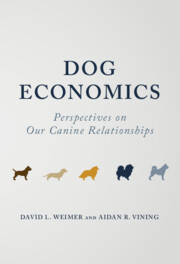Book contents
6 - A Doggone Shame
Hard Decisions about Euthanasia and Dogs’ Lives
Published online by Cambridge University Press: 11 January 2024
Summary
In Chapter 6, we confront the reality that many dog owners must eventually face decisions about their dogs’ end-of-life, potentially including hard decisions about euthanasia or costly medical interventions. We frame these decisions about ending life in terms of the owners’ fiduciary responsibilities and what they imply across different property rights regimes. We show how framing the relationship between dogs and humans in terms of principal-agent theory may offer some novel insights about responsibilities. We explore the appropriateness of euthanasia and how individual preferences and societal perspectives on its appropriateness have changed over time. We then examine the growth in pet health insurance and pre-paid veterinary plans and how this growth affects the economics of the choice between various treatments and euthanasia. We conclude by considering how individual and societal attitudes toward the use of dogs in medical research have changed over time. Nonetheless, although the number of dogs used in research has declined in recent years, many dogs still suffer and experience premature death.
Keywords
- Type
- Chapter
- Information
- Dog EconomicsPerspectives on Our Canine Relationships, pp. 113 - 136Publisher: Cambridge University PressPrint publication year: 2024



